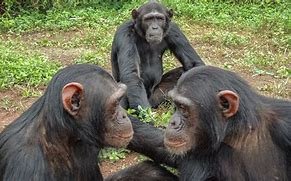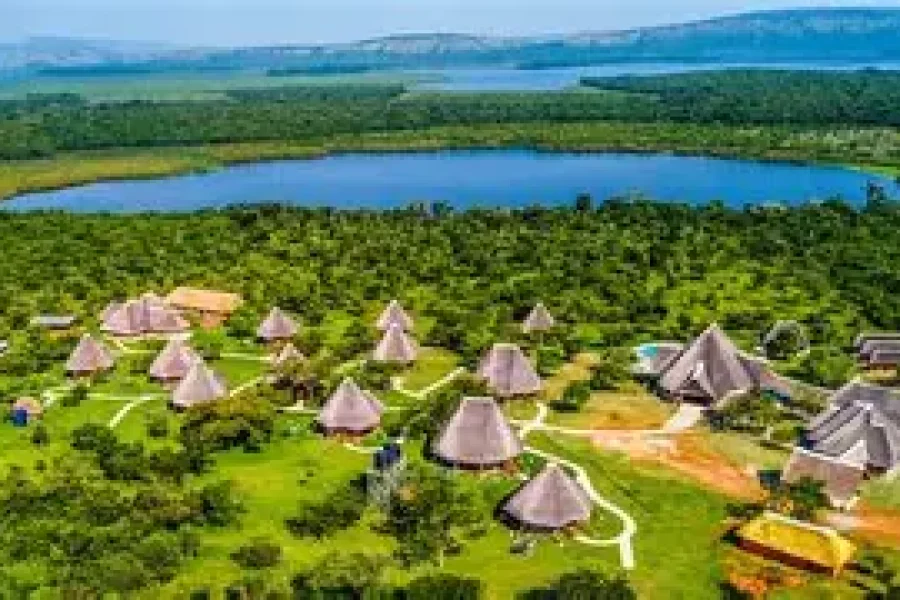Best African Safaris & Travel Services – African Authentic Safaris Ltd
1-Day Chimpanzee Island – Ngamba Sanctuary Trip
from 0 review
Day Trip
Daily Tour
Unlimited
___
Description
Experience an extraordinary wildlife encounter with our 1-Day Chimpanzee Island – Ngamba Sanctuary Trip. Just 45 minutes by boat from Entebbe, Ngamba Island Chimpanzee Sanctuary offers a remarkable opportunity to observe rescued chimpanzees in a natural setting. This 100-acre forested island in Lake Victoria provides a safe haven for over 50 orphaned and rescued chimpanzees who cannot be reintroduced to the wild. Your visit to this world-renowned sanctuary supports vital conservation efforts while allowing close observation of our closest living relatives. Witness the fascinating feeding sessions where chimpanzees display their natural behaviors, learn about individual rescue stories, and gain insights into the complex challenges of great ape conservation. This educational and emotionally moving day trip combines wildlife viewing with conservation awareness, all set against the stunning backdrop of Lake Victoria’s expansive waters. Perfect for wildlife enthusiasts, conservation-minded travelers, families, and anyone seeking a meaningful wildlife experience within easy reach of Entebbe.
Highlights
- · Observe rescued chimpanzees during feeding times from specially designed viewing platforms
- · Cruise across Lake Victoria, Africa’s largest lake, with panoramic views and bird watching
- · Learn about individual chimpanzee rescue stories from knowledgeable sanctuary guides
- · Contribute directly to conservation through your visit fees which support sanctuary operations
- · Guided tour of the sanctuary facilities including the feeding areas and health clinic
- · Opportunity for exclusive behind-the-scenes experiences (pre-booking required, additional cost)
- · Informative conservation education session highlighting the challenges facing great apes
- · Spectacular photo opportunities of chimpanzees in a natural island setting
- · Convenient half-day format perfect for travelers with limited time
- · Optional forest walks for those booking caregiver experiences (advance reservation required)
Detailed Itinerary

Morning Trip Option (08:00 AM - 01:00 PM)
08:00 AM: Check-in at Entebbe Pier
· Arrive at the Chimpanzee Sanctuary Wildlife Conservation Trust (CSWCT) offices near Entebbe
· Complete registration and safety briefing
· Receive your visitor badges and orientation information
08:30 AM: Boat Departure to Ngamba Island
· Board a comfortable covered speedboat for the journey
· Scenic 45-minute cruise across Lake Victoria
· Possible sightings of water birds and fishing activities
· Orientation talk about the sanctuary during the journey
09:15 AM: Arrival at Ngamba Island
· Welcome briefing from sanctuary staff
· Introduction to the sanctuary’s history and mission
· Health and safety guidelines for chimpanzee viewing
· Brief tour of the visitor facilities
09:45 AM: Morning Chimpanzee Feeding
· Observe the morning feeding session from the viewing platform
· Watch as chimpanzees emerge from the forest for their meal
· Learn to identify individual chimps and their unique stories
· Expert commentary from sanctuary caregivers about chimpanzee behavior
· Opportunity for questions and photography
10:45 AM: Behind-the-Scenes Tour
· Visit the sanctuary’s operational areas
· Learn about daily care procedures and health monitoring
· Understand the rehabilitation process for rescued chimps
· View the food preparation area and sleeping quarters
· Discussion of conservation challenges and solutions
11:30 AM: Conservation Education Session
· Interactive presentation on chimpanzee conservation
· Learn about threats facing wild chimpanzee populations
· Understand the bushmeat and pet trade issues
· Discover how the sanctuary contributes to conservation efforts
· Opportunity to ask questions and engage with sanctuary staff
12:00 PM: Departure from Ngamba Island
· Board the boat for return journey to Entebbe
· Final views of the island sanctuary
· Reflection discussion during the return cruise
12:45 PM: Arrival back at Entebbe Pier
· Disembark at the CSWCT offices
· Optional visit to the gift shop supporting conservation efforts
· End of tour services
Afternoon Trip Option (12:30 PM - 05:30 PM)
12:30 PM: Check-in at Entebbe Pier
· Arrive at the Chimpanzee Sanctuary Wildlife Conservation Trust (CSWCT) offices
· Complete registration and safety briefing
· Receive your visitor badges and orientation information
01:00 PM: Boat Departure to Ngamba Island
· Board a comfortable covered speedboat for the journey
· Scenic 45-minute cruise across Lake Victoria
· Possible sightings of water birds and fishing activities
· Orientation talk about the sanctuary during the journey
01:45 PM: Arrival at Ngamba Island
· Welcome briefing from sanctuary staff
· Introduction to the sanctuary’s history and mission
· Health and safety guidelines for chimpanzee viewing
· Brief tour of the visitor facilities
02:15 PM: Afternoon Chimpanzee Feeding
· Observe the afternoon feeding session from the viewing platform
· Watch as chimpanzees emerge from the forest for their meal
· Learn to identify individual chimps and their unique stories
· Expert commentary from sanctuary caregivers about chimpanzee behavior
· Opportunity for questions and photography
03:15 PM: Behind-the-Scenes Tour
· Visit the sanctuary’s operational areas
· Learn about daily care procedures and health monitoring
· Understand the rehabilitation process for rescued chimps
· View the food preparation area and sleeping quarters
· Discussion of conservation challenges and solutions
04:00 PM: Conservation Education Session
· Interactive presentation on chimpanzee conservation
· Learn about threats facing wild chimpanzee populations
· Understand the bushmeat and pet trade issues
· Discover how the sanctuary contributes to conservation efforts
· Opportunity to ask questions and engage with sanctuary staff
04:30 PM: Departure from Ngamba Island
· Board the boat for return journey to Entebbe
· Final views of the island sanctuary
· Reflection discussion during the return cruise
05:15 PM: Arrival back at Entebbe Pier
· Disembark at the CSWCT offices
· Optional visit to the gift shop supporting conservation efforts
· End of tour services
- · Return boat transportation between Entebbe and Ngamba Island
- · Sanctuary entrance fees and chimpanzee viewing permits
- · Professional sanctuary guides during your island visit
- · Chimpanzee feeding session observation
- · Behind-the-scenes sanctuary tour
- · Conservation education session
- · Life jackets and safety equipment during boat journey
- · Bottled water during the trip
- · All government taxes applicable to the activity
- · Visitor badges and information materials
- · Contribution to chimpanzee welfare through your visit fees
- · Meals and snacks (available as add-ons)
- · Personal travel insurance (recommended)
- · Souvenirs and crafts from the sanctuary gift shop
- · Optional caregiver experience with forest walk ($95 per person, advance booking required)
- · Tips and gratuities for sanctuary staff and boat crew (recommended: $5-10 per person)
- · Overnight accommodations on Ngamba Island (available as a separate booking)
- · Transportation to and from Entebbe pier (can be arranged at additional cost)
- · Personal expenses and items of a personal nature
- · Optional activities beyond those listed in the itinerary
- · International or domestic flights
Tour's Location
1. How close will I get to the chimpanzees during this day trip?
Visitors observe chimpanzees from specially designed elevated viewing platforms that overlook the feeding area, typically at a distance of 3-6 meters (10-20 feet). This proximity allows excellent observation and photography while maintaining appropriate safety barriers between humans and chimps. You’ll witness chimpanzees displaying natural behaviors like feeding, playing, tool use, and social interactions. For those seeking closer encounters, the optional Caregiver Experience (booked separately, $95 per person) allows participation in food preparation and a forest walk alongside caregivers where chimps may approach much closer. Standard day visitors do not have physical contact with the chimpanzees as this aligns with best practices for both animal welfare and human safety.
2. Is Ngamba Island suitable for children? What’s the minimum age for visitors?
Ngamba Island welcomes children aged 6 and above for standard sanctuary visits. The experience is educational and engaging for children, with sanctuary guides adapting their presentation style to be age-appropriate. Children particularly enjoy the boat journey and the feeding sessions where chimpanzee activity levels are highest. For families with younger children (under 12), we recommend the morning visit which typically features more active chimps. The minimum age for the optional Caregiver Experience is 12 years. All children must be supervised by adults at all times, maintaining appropriate behavior around the sanctuary. The educational components of the visit are valuable for developing conservation awareness in young visitors, making this an excellent family experience.
3. What’s the difference between visiting Ngamba Island and tracking wild chimpanzees in forests like Kibale?
Ngamba Island and wild chimpanzee tracking offer distinctly different experiences:
Ngamba Island Sanctuary:
· Guaranteed chimpanzee sightings at close range
· Easier, more accessible viewing from platforms
· No hiking required, suitable for all fitness levels
· Focus on rescue stories and conservation education
· Shorter time commitment (half-day possible)
· Lower cost than wild tracking permits
· Supports direct care of rescued chimps
Wild Chimpanzee Tracking (e.g., Kibale):
· Chimpanzees in their completely natural ecosystem
· More adventurous experience with forest hiking
· Observation of completely wild behaviors and territory use
· Less predictable but potentially more authentic encounters
· Typically requires full day commitment
· Higher permit costs support wild habitat conservation
· Often requires booking months in advance
Many wildlife enthusiasts choose to experience both for a complete understanding of chimpanzees in different contexts.
4. What should I bring and wear for the Ngamba Island visit?
For a comfortable and enjoyable visit to Ngamba Island, we recommend:
Essential items:
· Passport or ID (required for registration)
· Camera with zoom lens (no flash photography allowed)
· Sunscreen and hat
· Sunglasses
· Light rain jacket or poncho (weather can change quickly on the lake)
· Hand sanitizer
· Cash for souvenirs or optional expenses (USD or Ugandan Shillings)
Recommended clothing:
· Lightweight, breathable clothing
· Long-sleeved options for sun protection on the boat
· Comfortable walking shoes for the island tour
· Windbreaker or light jacket (the boat journey can be breezy)
The sanctuary has restroom facilities, a gift shop, and covered areas for protection from sun or rain. Binoculars are useful but not essential as the viewing distances are relatively close.
5. How rough is the boat crossing to Ngamba Island? Should I be concerned about motion sickness?
The boat journey to Ngamba Island takes approximately 45 minutes across Lake Victoria. Water conditions are typically calm to moderately choppy, especially during morning crossings. The sanctuary uses covered speedboats with comfortable seating and life jackets for all passengers. For those prone to motion sickness, we recommend:
· Choosing the morning crossing when the lake is usually calmer
· Taking motion sickness medication 30-60 minutes before departure
· Sitting in the middle of the boat where movement is less pronounced
· Focusing on the horizon rather than looking down
· Staying hydrated before and during the journey
Most visitors, including those with mild motion sickness concerns, find the crossing comfortable and enjoyable. In cases of extremely rough weather, the sanctuary may reschedule trips for safety reasons, though this is rare.
6. What is the best time of day to visit Ngamba Island for optimal chimpanzee viewing?
Both morning and afternoon visits offer excellent chimpanzee viewing, though with slight differences:
Morning Visit (8:00 AM - 1:00 PM):
· Chimpanzees are typically more active and playful
· Better lighting conditions for photography
· Cooler temperatures for a more comfortable experience
· Generally calmer lake conditions for the boat crossing
· Often less crowded than afternoon sessions
Afternoon Visit (12:30 PM - 5:30 PM):
· Potential for longer feeding observations as chimps are often hungrier
· Beautiful lighting for photography closer to sunset
· Opportunity to observe different social behaviors
· Potentially more dramatic sky backgrounds for photos
· Convenient timing for travelers with morning commitments
The sanctuary schedules feedings to ensure good chimpanzee viewing during both sessions. For photographers seeking optimal conditions, the morning light tends to be more favorable, while late afternoon offers warmer tones.
7. How does my visit contribute to chimpanzee conservation?
Your visit to Ngamba Island makes tangible contributions to chimpanzee conservation in several ways:
Direct financial support:
· Entrance fees directly fund daily care costs for rescued chimps (food, medicine, caregivers)
· Boat transport fees help maintain sanctuary infrastructure
· Gift shop purchases support education and outreach programs
Conservation impact:
· The sanctuary rescues chimps from illegal wildlife trade and inappropriate captivity
· Rehabilitated chimps receive lifetime care when they cannot return to the wild
· The sanctuary participates in regional conservation planning and policy development
· Research conducted at Ngamba contributes to scientific knowledge of chimpanzee behavior and health
Educational outcomes:
· Visitors become ambassadors for chimpanzee conservation
· Educational programs increase awareness of threats facing wild populations
· Local communities benefit from conservation-based employment opportunities
Approximately 80% of the sanctuary’s operating budget comes from visitor fees and donations, making tourism a crucial component of their conservation model.
8. Can I volunteer or have a more hands-on experience at Ngamba Island?
While the standard day visit does not include hands-on interactions, Ngamba Island offers several options for deeper engagement:
For day visitors:
· The Caregiver Experience ($95 per person, advance booking required) includes food preparation participation, a forest walk, and closer observation opportunities
· Behind-the-scenes tours can be customized for those with special interests in veterinary care or sanctuary operations
For longer-term involvement:
· Formal volunteer programs (1-3 months) for those with relevant skills (veterinary, education, research)
· Student internships for those studying primatology, conservation, or related fields
· Corporate volunteer days for organizations seeking team-building with conservation impact
All hands-on programs require advance application, health screening, and adherence to strict protocols to protect both chimps and humans. The sanctuary prioritizes the wellbeing of the chimpanzees over visitor experiences, so interaction opportunities are carefully managed. For details on current volunteer options, inquire directly with the sanctuary when booking your visit.
9. What other wildlife might I see during the Ngamba Island trip?
While chimpanzees are the main attraction, Ngamba Island and the surrounding waters offer diverse wildlife viewing opportunities:
On the island:
· Monitor lizards (often quite large and visible)
· Various butterfly species
· Multiple bird species including fish eagles, cormorants, and kingfishers
· Occasional otters along the shoreline
· Small forest duikers (tiny antelope)
During the boat journey:
· Numerous waterbird species
· Long-tailed cormorants diving for fish
· Occasionally hippos in the distance
· Fish jumping from the water
· Spectacular lake scenery with distant islands
The sanctuary itself hosts a butterfly garden and has informational signs about other local wildlife. Visitors interested in birdwatching should bring binoculars as Lake Victoria supports a rich avian ecosystem. Wildlife sightings beyond chimpanzees enhance the overall experience but vary seasonally and with weather conditions.
10. How does Ngamba Island compare to zoos or other primate sanctuaries?
Ngamba Island differs from traditional zoos and other primate facilities in several important ways:
Compared to zoos:
· Significantly larger natural space (100 acres of forest habitat versus typical zoo enclosures)
· Focus on rescue and welfare rather than exhibition
· Chimpanzees live in social groups with minimal human interference
· Educational emphasis on conservation challenges and individual rescue stories
· Revenue directly supports the animals being viewed
· Limited visitor numbers create less stressful viewing conditions
Compared to other sanctuaries:
· More accessible than many forest-based sanctuaries
· Offers guaranteed viewing without requiring hiking
· Island setting creates a natural barrier eliminating need for cages
· Transparent operation with strong international oversight
· Accredited by the Pan African Sanctuary Alliance (PASA)
· Unique combination of welfare, education, and conservation research
Ngamba Island represents the gold standard in sanctuary care, balancing visitor experience with the primary mission of providing optimal welfare for rescued chimpanzees who cannot return to the wild.





Leave a review